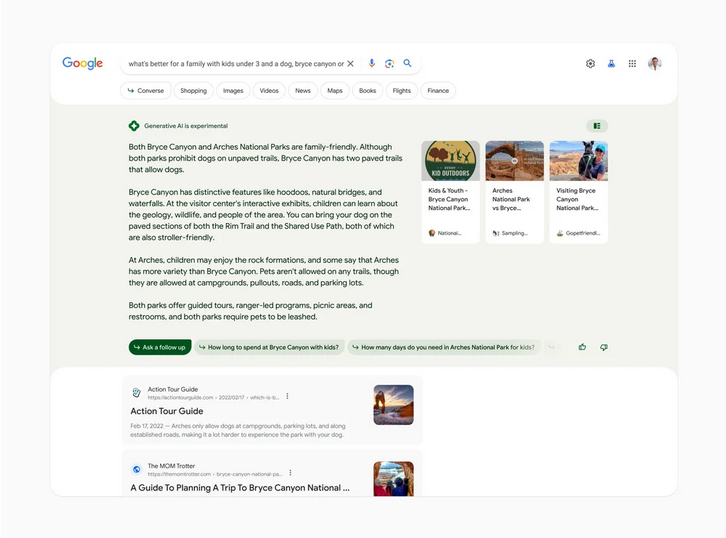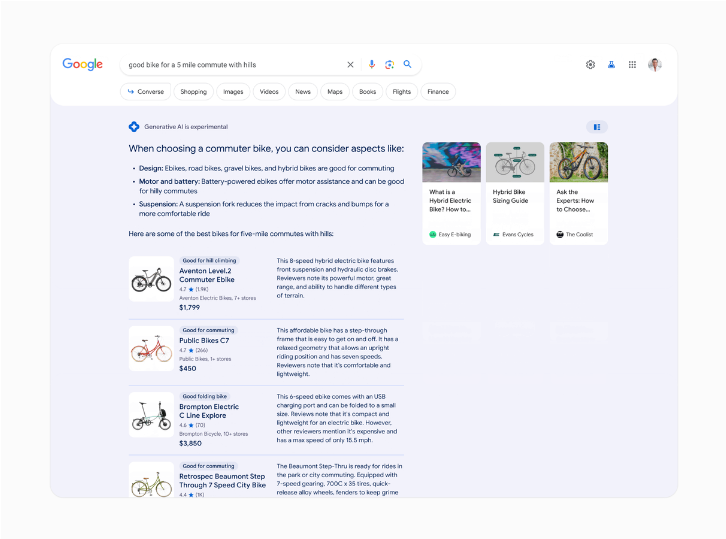Practical AI like ChatGPT has been evolving rapidly particularly in the last few months, bringing AI to the forefront of discussions of what our immediate future will look like in a number of industries.
Bringing this home and getting right to the point, Google has begun testing an AI supplemented version of their search engine results called SGE (Search Generative Experience). While at the time of my writing this, Google’s only featuring this for a select few who use Chrome or the Google app, but we can expect this to expand to their conventional SERPs for everyone in time.
This begs the question, how will this effect search engine optimization. Will AI replace SEO?
Will AI Replace SEO
AI will never fully “replace” SEO, but it will impact it with increasing significance the more sophisticated it becomes.
Its impact on SEO should be what the conversation should be about.
Let’s first take a look at what it’s going to look like, at least early on, using an example from Google itself about its generative AI search.
Here’s their first example, with someone’s informational query being an uber specific and focused question regarding local national parks.

Appearing above the traditional organic SERPs listings we see a sizable block of generative AI search results.
Quite cleverly, the AI has plucked the most relevant information from other websites, essentially poaching clicks, website visits and, perhaps most interestingly, ad revenue for Google and the site owner, from the websites themselves.
It’s also supplanted the informational type blogs which deal in hiking/national parks in this case below. It’s not just that the AI block is first; it’s bigger and colorful, easily drawing the eye to it over anything else on the page.
The AI block even offers a space for follow-up questions and suggests a couple relevant questions alongside it.
Google would likely be quick to point out that the block does include a couple links to relevant websites as part of the block.
How Will AI Affect SEO
Google’s AI is mostly designed for these very specific search queries which I’ll admit Google itself (or any search engine for that matter) doesn’t do very well at serving results for to begin with.
The one wildcard throughout all of this is Google’s reliance on ad revenue. According to this insightful article from Oberlo, more than half of Google’s 2022 income came from ads appearing on their platforms.
By increasingly discouraging people from clicking through to websites, it’s effectively stealing from its own pocket.
Unless a serious revenue shift develops, Google is still heavily reliant on driving traffic to websites.
At the same time, they want to deliver the best experience over their competitors in the other search engines. This is why the inclusion of websites as part of the AI block will likely continue to be a focus.
Here’s a second example of Google’s AI generated search results for someone looking for a particular bike based on certain conditions.

This format of AI results integrates Google’s existing sponsored ads or at least image/price links which you’d find if you just searched for “commuter bikes”.
The difference is you get more information than you once did for each ad listing.
Also note that once again, we get a few websites listed on the right as kind of “sources” or resources for further information on the subject.
It’s hard to say whether someone would click on one of those websites or go straight for one of the listings below; it would depending on the potential consumer.
In Conclusion – Will AI Replace SEO
While there’s a lot that is still unknown and will need to play out before we truly understand its effects, one thing is certain, AI will not outright replace SEO.
It will undoubtedly affect SEO, as I believe we’ll see a continuation of how SEO was already evolving.
More than ever before, content is king (it’s my best SEO tip, afterall).
You or whomever writes the content for your website now more than ever should be making sure that your content (and website itself) offers something unique. Your content should continue to work in relevant long tail phrases to your main keyword as voice and personalized/more specific search continue to dominate the average query in Google like the examples Google gave.
This will keep the pages of your website relevant in Google’s eyes to where you’ll find your content becoming a part of their AI generated results.
Yes, it’s certain that some “genres” of websites will take a hit over others, especially early on.
But it’s important to point out one last time that it’s still in Google’s best interest to serve up the best content to its users, and while its AI will be working to better identify what is objectively the best content, make sure that its your website and content which qualifies.
